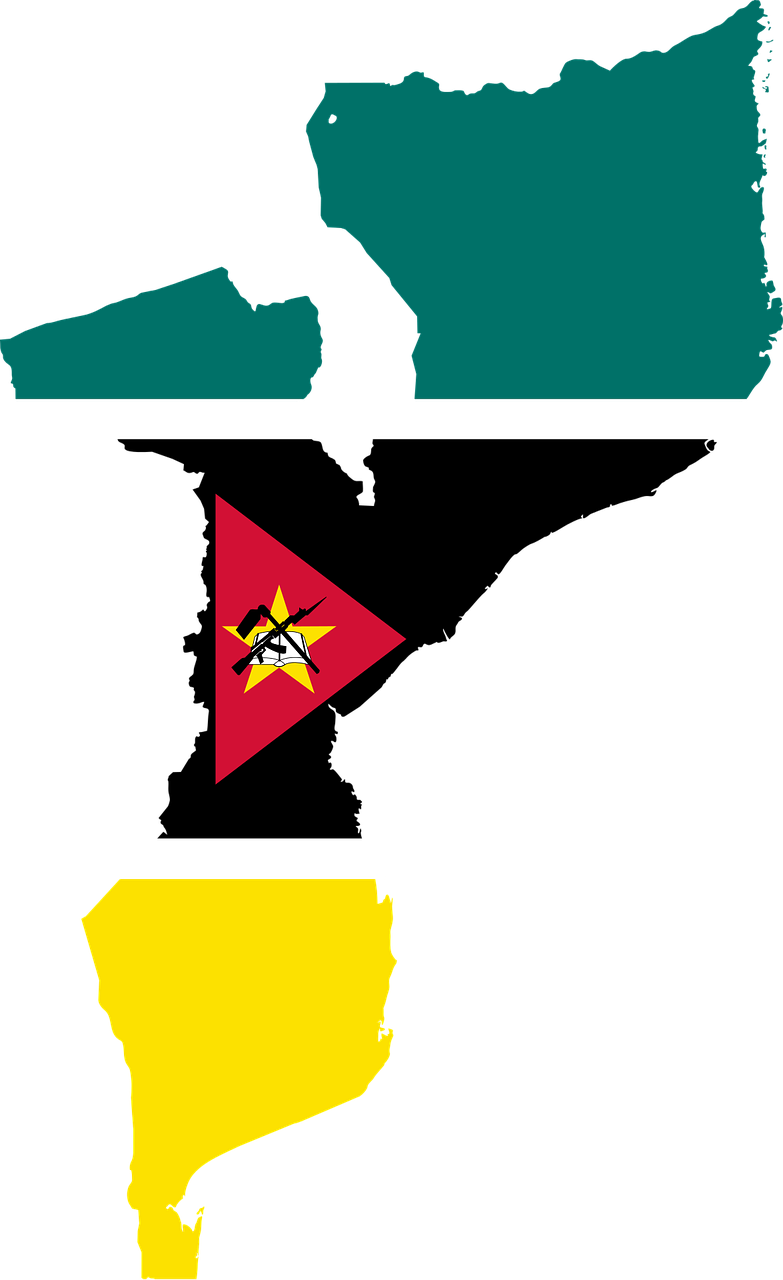Mozambique
Overview
Mozambique, "Heart of the Indian Ocean"
Mozambique, often described as the "Heart of the Indian Ocean," is a southeastern African nation that boasts a vast coastline, rich cultural heritage, and immense natural resources. Stretching along the eastern coast of Africa, it is bathed by the warm waters of the Indian Ocean, offering pristine beaches, coral reefs, and a plethora of marine life.
Maputo, the capital, is a vibrant city that embodies Mozambique's colonial past, its struggle for independence, and its aspirations for the future. It's a city where modern architecture stands alongside historical landmarks, where bustling markets coexist with contemporary art galleries and cafes. Beyond Maputo, cities like Beira, Nampula, and Pemba each narrate a unique tale of Mozambique's diverse regions and influences.

Key indicators

Population

GDP per capita

Nominal GDP

Purchasing Power Parity GDP

Main exports

Foreign direct investment

Stock market capitalization

GDP growth rate
- Economic Snapshot
- Business Environment
- Startup Ecosystem
- Infrastructure & Technology
- Opportunities & Challenges
- Cultural Insights
Mozambique's economy has traditionally been anchored in agriculture, with crops like cashew nuts, cassava, and sugarcane playing significant roles. However, the discovery of vast natural gas reserves in the Rovuma Basin has positioned Mozambique as a future global leader in liquefied natural gas (LNG) production. This has the potential to transform the nation's economic landscape, bringing in foreign investment and boosting infrastructure development.
Tourism is another growing sector, with Mozambique's national parks, such as Gorongosa and Niassa Reserve, and its idyllic islands like Bazaruto and Quirimbas, drawing tourists seeking both adventure and relaxation. The rich cultural heritage, influenced by Bantu, Swahili, Arab, and Portuguese civilizations, adds another dimension to Mozambique's tourism offerings.
Mozambique offers a conducive environment for business and investment. Recognizing the importance of a diversified and sustainable economy, the government has initiated reforms to bolster various sectors, from agriculture and manufacturing to tourism and energy. The nation's strategic location, with access to both African and global markets via its ports, enhances its trade and investment potential.
Mozambique's labor force is young and increasingly skilled. With a focus on education and vocational training, the country is preparing its youth to drive its economic and technological aspirations. The entrepreneurial spirit is evident in the bustling markets of Maputo, the tech startups emerging across the country, and the innovations in the agricultural and energy sectors.
Mozambique's startup ecosystem, though in its early stages, is showing signs of vibrancy. Maputo, in particular, is becoming a hub for innovation and entrepreneurial ventures. The growth of tech hubs and incubators is a testament to the nation's focus on fostering a startup culture. From fintech solutions aimed at enhancing financial inclusion to agritech innovations that seek to revolutionize farming practices, Mozambican startups are carving a niche for themselves.
Collaboration between academia, the private sector, and the government is fostering a culture of innovation, research, and development. Access to funding, mentorship programs, and market linkages are ensuring that startups not only take root but also thrive and scale.
Infrastructure development is pivotal to Mozambique's growth strategy. Roads, railways, ports, and energy projects have seen significant investments in recent years. The government's focus on enhancing digital infrastructure is evident in its push for greater internet connectivity, digital literacy, and e-governance initiatives. Mobile money platforms have revolutionized banking in Mozambique, offering financial services to those who were previously unbanked.
Mozambique is also focusing on sustainable energy solutions. With abundant sunlight and numerous rivers, solar and hydropower projects are gaining momentum. These initiatives underscore Mozambique's commitment to sustainable development and its vision for a future powered by clean and renewable energy sources.
Mozambique, with its strategic location, abundant resources, and youthful population, offers a plethora of opportunities. Sectors like energy, agriculture, tourism, and technology are particularly promising. The government's focus on industrialization, value addition, and export promotion presents numerous avenues for collaboration and investment.
However, challenges persist. Issues related to land ownership, bureaucratic hurdles, and the need for further infrastructural development are areas that need attention. But with challenges come opportunities. Mozambique's resilience, coupled with its vision for the future, makes it a compelling destination for investors and entrepreneurs.
-
Mozambique is a multicultural country with a rich history and heritage. The country is home to over 20 ethnic groups, each with its own unique culture and traditions. The most populous ethnic groups in Mozambique are the Makhuwa, the Ronga, and the Tsonga.
-
Mozambicans are generally friendly and welcoming. They are also known for their strong sense of community and family.
-
Some of the most important cultural traditions in Mozambique include:
- Greetings: It is customary to greet people with a handshake and a greeting in their language. The most common greetings are "Bom dia" (Portuguese), "Wa bona" (Makhuwa), and "Mwariko" (Ronga).
- Hospitality: Mozambicans are known for their hospitality. They often invite guests into their homes and offer them food and drinks. It is considered rude to refuse a Mozambican's hospitality.
- Dressing: Mozambicans dress in a variety of styles, depending on the occasion. However, it is important to dress respectfully when visiting Mozambique. This means avoiding revealing clothing and dressing appropriately for the occasion.
- Food: Mozambican food is delicious and diverse. Some of the most popular dishes include:
- Matapa: A stew made with cassava leaves, peanuts, and coconut milk.
- Galo à Zambeziana: A chicken dish cooked in coconut milk and palm oil.
- Camarão na muamba: A shrimp dish cooked in a sauce made from peanuts, tomatoes, and onions.
- Pão: A type of flatbread made from cassava flour.
- Music and dance: Mozambique has a vibrant music and dance culture. Some of the most popular Mozambican musical genres include marrabenta, timbila, and kizomba. Traditional Mozambican dance is characterized by its energetic and rhythmic movements.
Here are some tips for businesses and investors operating in Mozambique:
- Be respectful of Mozambican culture and traditions. This includes being respectful of traditional customs and beliefs.
- Be patient and understanding. Mozambicans are generally relaxed and easy-going. It is important to be patient and understanding when doing business in Mozambique.
- Build relationships. Mozambicans value personal relationships in business. It is important to build rapport with your Mozambican counterparts before getting down to business.
- Be ethical and responsible. Mozambicans are looking for businesses that are ethical and responsible in their dealings.

Investment Landscape & Opportunities in Mozambique
- Start-up & SME Investments
- Impact & Green Investments
- Government Bonds & Stock Market
- Public-Private Partnerships
- Foreign Direct Investments
- Commodities & Infrastructure Investments
- Real Estate Development
- Cultural and Creative Industries

Leading
startups in Mozambique
Comming up soon

